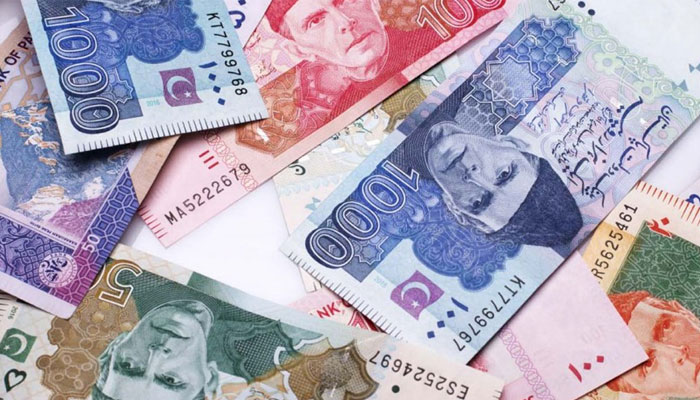Rupee ranks Asia’s top 3 after hitting six-and-a-half months high
Pak rupee secured the third best-performing currency position in Asia after Indonesian rupiah and South Korean won
KARACHI: Rupee reached six and a half months high of 158.9 against the US dollar in the interbank trade on Monday, clinching the top-3 rank in the list of Asia’s best performing currencies with the politically-stressed government struggling to strengthen the country’s foreign exchange position to tame imported inflation and appease masses.
The rupee closed at 159.09 in the interbank market during the previous session. It appreciated 18 paisas against the dollar during the session. The rupee gained 30 paisas to settle at 158.8 against the dollar in the open market. It was also up Rs10.2 or six percent from a low of 169.
Analysts said the rupee entered in the list of the best-performing currencies in Asia, appreciating by 3.1 percent against the US dollar since October 1, thereby securing the third best-performing currency position in Asia after Indonesian rupiah and South Korean won.
The Indonesian currency increase 4.5 percent, while the won was up 3.6 percent.
Since August 26, Pakistani rupee has posted a gain of Rs9.52 or 5.6 percent. Dealers said the currency continued to rise in its value versus the greenback on the back of increased inflows. Demand for the dollars from importers remains subdued in the market.
“There were routine [import] payments, while sale of forward dollars by exporters increased in the last few days,” said a currency dealer. Dealers also said the central bank is not intervening to prevent a persistent appreciation in the exchange rate.
Rise in foreign exchange reserves, robust remittances, improvement in the balance of payments position and pick up in inflows from the overseas Pakistanis have helped strengthening the rupee’s value.
Many dealers expect the rupee’s rally to continue in days ahead. “We anticipate the rupee to trade around 157-level against the dollar over the next couple of trading sessions,” said another dealer. Analysts said a drop in PKR/USD parity reduces pressure on the country's external debt as well as imported inflation in the country.
“Exports should not be hurt in the short run as the country's export capacity, as per reports, is already operating at 100-120 percent, while real effective exchange rate index (measuring competitiveness through relative currency parity) also has room for further improvement in PKR/USD parity,” said analyst Khurram Schehzad in a tweet.
“So, improving currency parity should result in the country's improved ability in servicing its external debt as well as taming imported inflation that affects masses.” There are a number of reasons behind the rupee’s appreciation in recent days.
The State Bank of Pakistan is not selling dollars to support the domestic currency amid rise in the country’s foreign exchange reserves. The SBP’s swap book has improved, gaining about $900 million month-on-month in forward legs. The foreign currency funding to banks remains uninterrupted, which is evident from the fact that their net open positions have not deteriorated.
Turnaround times for large import payments have reduced, with the SBP allowing hedging of 50 percent letter of credit based payments. Foreign exchange reserves rose to $19.4 billion during the week ended October 29 from $19.3 billion a week earlier.
The reserves held by the central bank increased $61 million to $12.2 billion. However, scheduled outflows of approximately $2billion this year and the fear of increase in the coronavirus infections pose a risk to the economic recovery and the rupee’s outlook.
-
 Jessica Alba, Cash Warren Finalize Divorce After 16 Years Of Marriage
Jessica Alba, Cash Warren Finalize Divorce After 16 Years Of Marriage -
 China’s AI Boom Takes Center Stage At Spring Festival One Year After DeepSeek Stirred The Industry
China’s AI Boom Takes Center Stage At Spring Festival One Year After DeepSeek Stirred The Industry -
 James Van Der Beek Called His Sixth Child Jeremiah 'healing For Us' Before His Death
James Van Der Beek Called His Sixth Child Jeremiah 'healing For Us' Before His Death -
 Elon Musk Vs Reid Hoffman: Epstein Files Fuel Public Spat Between Tech Billionaires
Elon Musk Vs Reid Hoffman: Epstein Files Fuel Public Spat Between Tech Billionaires -
 Gordon Ramsay Denies Victoria Beckham Got Handsy With Brooklyn At His Wedding
Gordon Ramsay Denies Victoria Beckham Got Handsy With Brooklyn At His Wedding -
 Gordon Ramsay Makes Unexpected Plea To Brooklyn As He Addresses Beckham Family Feud
Gordon Ramsay Makes Unexpected Plea To Brooklyn As He Addresses Beckham Family Feud -
 Prince Harry Warns Meghan Markle To 'step Back'
Prince Harry Warns Meghan Markle To 'step Back' -
 Selena Gomez Explains Why She Thought Lupus Was 'life-or-death'
Selena Gomez Explains Why She Thought Lupus Was 'life-or-death' -
 New Zealand Flood Crisis: State Of Emergency Declared As North Island Braces For More Storms
New Zealand Flood Crisis: State Of Emergency Declared As North Island Braces For More Storms -
 Nancy Guthrie Case: Mystery Deepens As Unknown DNA Found At Property
Nancy Guthrie Case: Mystery Deepens As Unknown DNA Found At Property -
 James Van Der Beek's Brother Breaks Silence On Actor's Tragic Death
James Van Der Beek's Brother Breaks Silence On Actor's Tragic Death -
 Megan Thee Stallion On New Romance With Klay Thompson: 'I'm Comfy'
Megan Thee Stallion On New Romance With Klay Thompson: 'I'm Comfy' -
 Nicole Kidman Celebrates Galentine’s Day Months After Keith Urban Split
Nicole Kidman Celebrates Galentine’s Day Months After Keith Urban Split -
 Justin Bieber Unveils Hailey Bieber As First Face Of SKYLRK In Intimate Campaign Debut
Justin Bieber Unveils Hailey Bieber As First Face Of SKYLRK In Intimate Campaign Debut -
 Caitlin O’Connor Says Fiance Joe Manganiello Has Changed Valentine’s Day For Her
Caitlin O’Connor Says Fiance Joe Manganiello Has Changed Valentine’s Day For Her -
 Rachel Zoe Sends Out Message For Womne With Her Post-divorce Diamond Ring
Rachel Zoe Sends Out Message For Womne With Her Post-divorce Diamond Ring




